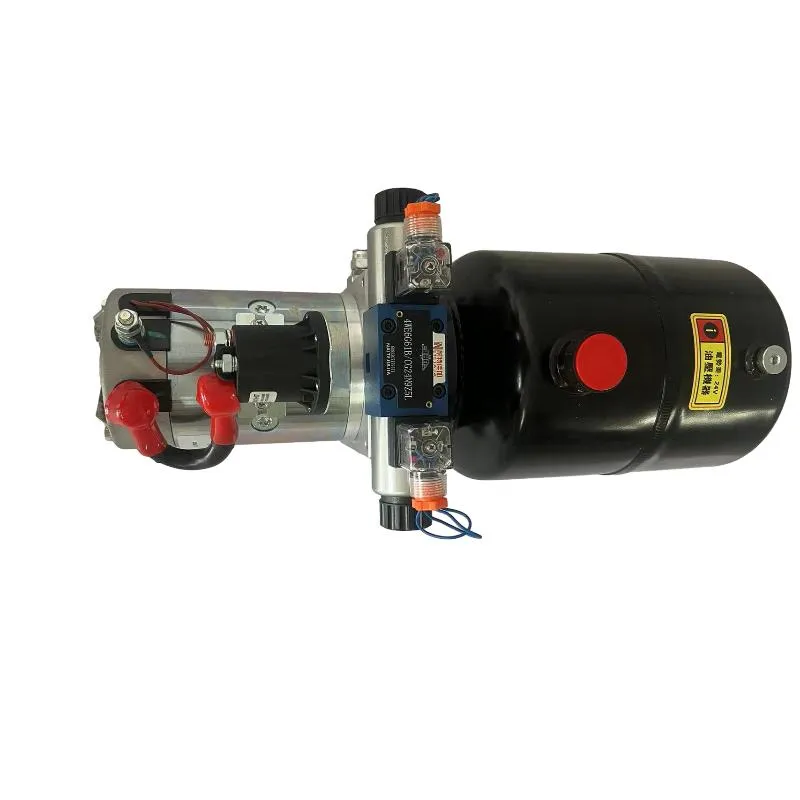Dec . 04, 2024 08:50 Back to list
Tailored Electric Hydraulic Cylinders for Enhanced Performance and Efficiency Solutions
Custom Electric Hydraulic Cylinders Revolutionizing Industrial Automation
In recent years, the demand for efficient and precise actuation systems in various industries has propelled the development of custom electric hydraulic cylinders. These advanced devices combine the benefits of electric actuators with the high force output traditionally associated with hydraulic systems, resulting in innovative solutions for a range of applications. This article delves into the advantages, applications, and future trends surrounding custom electric hydraulic cylinders.
Understanding Custom Electric Hydraulic Cylinders
Custom electric hydraulic cylinders are tailor-made actuators that integrate electric motors with hydraulic systems. By leveraging the principles of both electric and hydraulic technology, these cylinders provide enhanced performance and flexibility. Unlike conventional hydraulic cylinders, which rely on fluid pressure generated by a pump, electric hydraulic cylinders utilize electric drives to control hydraulic fluid flow, thus allowing for greater precision and responsiveness.
The customization aspect is crucial; industries often have unique requirements regarding stroke length, force output, size, and specific environmental conditions. Custom solutions enable manufacturers to design hydraulic cylinders that are specifically suited to the needs of their operations, whether in manufacturing, construction, or aerospace.
Advantages of Custom Electric Hydraulic Cylinders
1. Increased Efficiency One of the most significant advantages of electric hydraulic cylinders is their efficiency. Traditional hydraulic systems often suffer from energy losses due to leaks and heat. In contrast, electric drives can provide on-demand power, leading to substantial energy savings and reduced operational costs.
2. Enhanced Precision and Control Electric hydraulic cylinders offer improved precision in positioning and motion control. With advanced controllers and feedback systems, these cylinders can achieve lower hysteresis and higher repeatability, making them ideal for tasks requiring fine control.
3. Compact Design Custom designs often result in more compact units. By integrating electric components with hydraulic cylinders, manufacturers can save valuable space in machinery and equipment without sacrificing performance.
4. Reduced Maintenance Electric hydraulic cylinders typically require less maintenance than traditional hydraulic systems. With fewer moving parts and lower chances of fluid leakage, these systems offer greater reliability and longevity, reducing downtime and repair costs.
5. Environmentally Friendly As industries become more environmentally conscious, electric hydraulic cylinders provide a greener alternative. They produce fewer emissions, consume less energy, and eliminate the risks associated with hydraulic fluid leaks.
custom electric hydraulic cylinder

Applications Across Industries
The versatility of custom electric hydraulic cylinders allows their application across various sectors
- Manufacturing In assembly lines and automation processes, electric hydraulic cylinders can enhance the performance of robotics, conveyor systems, and tooling applications. - Construction These cylinders are integral in construction machinery, such as excavators and lift systems, where substantial force and precise control are paramount.
- Aerospace Due to their reliability and lightweight construction, electric hydraulic cylinders are increasingly used in aircraft systems, including landing gear and cargo doors.
- Automotive In the automotive sector, these cylinders can be utilized in testing equipment, assembly processes, and even in electric vehicles where weight reduction is critical.
Future Trends
As technology advances, the future of custom electric hydraulic cylinders looks promising. Innovations such as IoT integration for real-time monitoring, AI algorithms for predictive maintenance, and further miniaturization are likely to enhance their capabilities. The increasing adoption of automation and Industry 4.0 will drive demand for these actuators, emphasizing the need for customized solutions tailored to specific applications.
Additionally, with a growing focus on sustainability, manufacturers will continue to explore environmentally friendly materials and practices in the design and production of electric hydraulic cylinders.
Conclusion
Custom electric hydraulic cylinders represent a significant advancement in the field of actuation technology. Their ability to combine the strengths of both electric and hydraulic systems offers unprecedented efficiency, precision, and versatility across various industries. As industries continue to evolve and embrace automation, custom electric hydraulic cylinders will play an essential role in shaping the future of industrial processes, driving innovation, and meeting the challenges of modern manufacturing and automation.
-
Fork Lift Power Units - Hebei Shenghan | Efficiency, Reliability
NewsJul.13,2025
-
1.5-Ton Turbocharged Cylinder-Hebei Shenghan|Hydraulic Solution,Energy Efficiency
NewsJul.13,2025
-
Auto Hoist Power Units-Hebei Shenghan|Efficiency&Industrial Lifting
NewsJul.13,2025
-
Double Acting Power Units-Hebei Shenghan|Hydraulic Solutions,Industrial Efficiency
NewsJul.13,2025
-
1.5 Ton Lifting Cylinder 70/82-40-290-535 - High-Performance Hydraulic Solution | Hebei Shenghan
NewsJul.13,2025
-
Fork Lift Power Units - Hebei Shenghan | Efficiency&Reliability
NewsJul.13,2025
